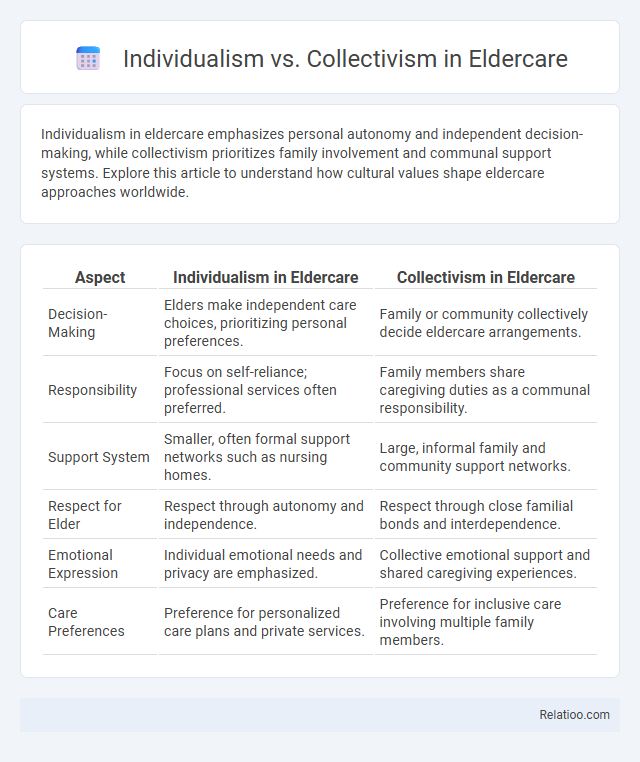Individualism in eldercare emphasizes personal autonomy and independent decision-making, while collectivism prioritizes family involvement and communal support systems. Explore this article to understand how cultural values shape eldercare approaches worldwide.
Table of Comparison
| Aspect | Individualism in Eldercare | Collectivism in Eldercare |
|---|---|---|
| Decision-Making | Elders make independent care choices, prioritizing personal preferences. | Family or community collectively decide eldercare arrangements. |
| Responsibility | Focus on self-reliance; professional services often preferred. | Family members share caregiving duties as a communal responsibility. |
| Support System | Smaller, often formal support networks such as nursing homes. | Large, informal family and community support networks. |
| Respect for Elder | Respect through autonomy and independence. | Respect through close familial bonds and interdependence. |
| Emotional Expression | Individual emotional needs and privacy are emphasized. | Collective emotional support and shared caregiving experiences. |
| Care Preferences | Preference for personalized care plans and private services. | Preference for inclusive care involving multiple family members. |
Understanding Individualism and Collectivism in Eldercare
Understanding individualism in eldercare emphasizes respecting the autonomy and personal preferences of older adults, allowing them to make decisions about their care and lifestyle. Collectivism in eldercare prioritizes the needs of the family or community, fostering shared responsibilities and support systems for the elderly. Balancing these cultural dimensions ensures eldercare practices that honor both personal independence and collective well-being.
Historical Perspectives on Eldercare Approaches
Historical perspectives on eldercare reveal a spectrum between individualism and collectivism, where individualistic societies emphasize personal autonomy and self-reliance in aging, contrasting with collectivist cultures that prioritize family and community support systems. Traditional eldercare in collectivist frameworks often involves multigenerational households and community-based caregiving, reflecting strong social bonds and shared responsibilities. In contrast, individualistic approaches have led to the development of formal institutions and professional services aimed at preserving elders' independence and privacy.
Core Values of Individualistic Eldercare Systems
Individualistic eldercare systems emphasize autonomy, personal choice, and respect for the elder's unique preferences, promoting independence in decision-making and daily activities. Core values include self-determination, privacy, and tailored care plans that prioritize the elder's individual needs and rights over communal or family-based decision structures. This approach often results in personalized services, fostering dignity and empowerment for seniors within healthcare and residential environments.
Collective Responsibility in Caring for the Elderly
Collective responsibility in eldercare emphasizes the shared duty of family members, communities, and social institutions to ensure the well-being of elderly individuals, contrasting with individualism where care often falls solely on personal caregivers. You benefit from a supportive network that promotes holistic health, social engagement, and reduces caregiver burnout, fostering an environment where elderly care is a communal priority. Societies with collectivist values typically demonstrate better systemic eldercare through policies and cultural norms that prioritize interdependence and mutual support.
Family Roles in Individualist vs Collectivist Cultures
Family roles in eldercare differ significantly between individualist and collectivist cultures, impacting your approach to caregiving responsibilities. In individualist societies, eldercare often emphasizes personal autonomy, with family members encouraging independence and relying on professional services. Collectivist cultures prioritize collective family responsibility, where multiple generations actively participate in caregiving, reinforcing social support and interdependence.
Government Policies Shaped by Cultural Values
Government policies on eldercare are deeply influenced by cultural values reflecting individualism or collectivism, shaping the support structures available to older adults. In individualistic societies, policies often emphasize personal responsibility and autonomy, offering services like home care and private insurance options designed to empower your independent living. Collectivist cultures tend to promote family-based care supported by social welfare programs and community involvement, embedding eldercare within a broader social responsibility framework.
Social Support Structures for Aging Populations
In eldercare, individualism emphasizes personal autonomy and tailored care plans that respect seniors' preferences, fostering independence within support systems. Collectivism prioritizes communal responsibility, integrating family and community networks to provide comprehensive social support for aging populations. Effective eldercare often balances these approaches, creating social support structures that address both individual needs and collective well-being.
Ethical Dilemmas: Autonomy vs Community Obligations
Ethical dilemmas in eldercare often arise from the tension between individualism, emphasizing personal autonomy, and collectivism, which prioritizes community obligations and family caregiving. Balancing elders' rights to self-determination with culturally ingrained expectations of collective responsibility challenges caregivers and policymakers alike. Strategies that integrate personalized care plans while respecting communal values foster more ethically sound eldercare outcomes.
Balancing Independence and Interdependence in Eldercare
Balancing independence and interdependence in eldercare requires understanding cultural dimensions like individualism and collectivism, which influence caregiving preferences and expectations. In individualistic societies, eldercare emphasizes personal autonomy and self-sufficiency, encouraging seniors to maintain control over their daily lives while seeking support only as needed. Conversely, collectivist cultures prioritize family involvement and communal support, fostering interconnected caregiving approaches that ensure elders are cared for within a network of relatives and community resources.
Future Trends: Integrating Individualism and Collectivism
Future trends in eldercare emphasize integrating individualism and collectivism to enhance personalized care while fostering community support. Innovations like technology-driven personalized health plans enable Your unique needs to be met alongside group-based social activities promoting mental and emotional well-being. Balancing autonomy with collaborative care models represents the evolving approach in eldercare systems worldwide.

Infographic: Individualism vs Collectivism in eldercare
 relatioo.com
relatioo.com